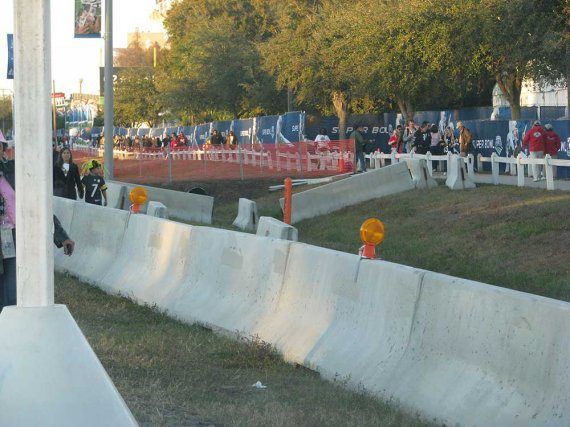Learn About Jersey Barriers and Vehicle Impact
One of the most common concrete barriers on US highways is the reinforced Jersey Barrier. These barriers are popular based on their ability to minimize body damage to vehicles which may collide with the barriers during vehicle impact. Their sloped design allows tires to ride up the lower angel, pushing the body away from the structure.
If vehicles hit the barrier higher, the angled shape serves as a multi-staged barrier. The vehicle bumper impacts the upper face of the barrier and glides upward. This causes the vehicle to lift on an upward angle while crushing the front bumper. Once the bumper area has been crushed the wheels come in contact with the sloped lower portion of the barrier and lift the vehicle further and compress the front suspension.
Once the tires have made impact with the barriers lower slope it can be redirected back to the roadway. However, if the vehicle is lifted too high on the barrier it will flip so to avoid this problem the barriers employ a smooth surface. Rougher exteriors tend to grab the sides of the tires and increase the lift, causing the vehicle to flip. These barriers are also most effective when adjacent to a paved roadway, allowing the vehicle tires to grip the roadway rather then dig into soft dirt which could make a rollover more likely.
Each barrier is designed with a vertical reveal, which assists in creating a clean edge for paving. The drainage openings in the face of this reveal are designed so as not to interfere with the stability of any vehicle which may interact with them. This ensures the vehicle will not lose control and turn over. In essence, the reveal has very little, if any impact on the safety aspect of the barrier.
One of the most important safety aspects of a safety barrier is the distance allowed between the ground and the slopes break point. The distance must be enough to effectively compress the suspension while not contributing to excessive lift which would cause rollover. For these reasons the distance on the Jersey Barrier is 13 inches.
Although the Jersey barrier’s shape has proven effective in crash tests, a new configuration of the barrier known as the F-shape was proven to perform better. The F-Shape, however, was not widely adopted since many municipalities had already invested substantial funds in the barriers they already had. Since the new F-shape only proved to be slightly more effective and since the Jersey barriers already had a proven safety record, many decided to stick with what they had and avoid the extra costs in replacing them with the new design.
The slopes of the F-shape and the NJ-shape are the same. The major difference is that the distance from the ground to the slope break point of the F-shape is 255 mm — 75 mm lower than the NJ-shape. The lower slope break point significantly reduced the lifting of the vehicle and greatly improved the performance of the concrete barrier.
Large trucks and buses coming into contact with the Jersey barrier will usually lift and ride along the top edge of the barrier which prevents them from flipping. Since these vehicles generally glide across the tops of the forms it is important to keep them free of obstructions such as signage and or any other attachments which could attach to the vehicle or catch it, causing it to flip or creating more significant undercarriage damage. If reflective supports are required for safety, the barriers are generally made wider at the top to assist in supporting these devices and the design is then flared out to ensure a even transition for an impacting vehicle.
Plastic Jersey Barriers are available for purchase and rental at Tamis Corp.
Established in 1983, The Tamis Corporation is a multi-divisional company providing a wide range of crowd control, security, traffic safety, event management, sanitation, and other products.
Through our numerous divisions, Tamis is the established industry leader in direct sales and rentals of a diverse group of products, including steel barriers, traffic cones, waste receptacles, turnstiles, and metal detectors.
We provide our new and long-term customers with friendly, personalized service. When you call Tamis, you’ll talk to a knowledgeable specialist who thoroughly understands our products and strives to meet your needs.

